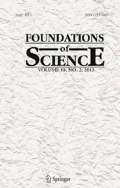Abstract
There is a central doctrine in Aristotle that usually isn’t recognized in its importance: the affirmation of the difference and the plurality. In the course of the centuries, Aristotelism lost which was perhaps its most characteristic and specific feature versus Platonism, that is, its criticism of unity and its defense of plurality. The first principle is not the One but the plurality. The horizon of thinking is not the unity but the diversity of the logos. The unity of the logos presupposes the differences within reality. Heidegger attracted attention to the peculiarity of the practical philosophy of Aristotle. It was the case of dialectics, rhetoric, poetics, ethics, politics, etc. We are referring to knowledges that are art rather than science. Nothing is so differentiated as human action, as it is always performed from a new starting point. Dialectic and rhetorical speeches are always circumscribed to the individual.
Similar content being viewed by others
References
Alfarabi (1953) Catálogo de las ciencias. CSIC, Madrid
d’Ancona C. (1995) Recherches sur le Liber de causis. Vrin, Paris
Aristote (1973). Physique (Phys.), Paris: Les Belles Lettres, H. Carteron (Ed.).
Aristóteles (1970a). Metafísica (Met.), Madrid: Gredos V. García Yebra (Ed.).
Aristóteles (1970b). \’Etica a Nicómaco (EN.), Madrid: Instituto Estudios Políticos, Madrid, M. Araujo y J. Marías (Eds.).
Aristóteles (1971). Retórica (Ret.), Madrid: Instituto Estudios Políticos, Madrid, A. Tovar (Ed.).
Aristotle (1960). Topics (Top.), Loeb Classical Library, E. S. Forster (Ed.).
Aristotle (1987). On sophistical refutations (Soph. Ref.), Loeb Classical Library, E. S. Forster (Ed.).
Aquinas, T. (1950). Summa theologiae, I–II, q. 90 y ss. Taurini-Romae: Marietti.
Beierwaltes, W. (1980). Identität und Differenz, Frankfurt a.M.: Klostermann
Black D.L. (1990) Logic and Aristotle’s rhetoric and poetics in medieval arabic philosophy. Leiden, Brill
Gadamer, H. G. (1977). La actualidad hermenéutica de Aristóteles. In Verdad y Método (Vol. I, pp. 383–396). Salamanca: Sígueme
Gadamer, H. G. (1992). Autopresentación de Hans-Georg Gadamer (pp. 375–402); Problemas de la razón práctica (pp. 313–314). In Verdad y Método (Vol. II). Salamanca: Sígueme
Gundissalinus, D. (1954). De scientiis. Madrid: CSIC, M. Alonso (Ed.)
de Garay J. (2001) La diferencia en Aristóteles. Anales de la Real Academia de Doctores 5: 251–260
de Garay J. (2005) Hermenéutica y formas aristotélicas de racionalidad. In: Oñate T.(eds) Hans-Georg Gadamer: Ontología estética y hermenéutica. Dykinson, Madrid, pp 329–354
Garin, E. (2001). Medioevo y renacimiento (pp. 95–111, 155–206). Madrid: Taurus.
Granada, M. A. (2000). El umbral de la modernidad (pp. 291–324). Barcelona: Herder.
Hallaq, W.B. (eds) (1993) Ibn Taymiyya against the greek logicians. Oxford University Press, Oxford
Hegel, G. W. F. (1997). Lecciones de historia de la filosofía (Vol. III). México: FCE.
Heidegger, M. (2002). Interpretaciones fenomenológicas sobre Aristóteles. Indicación de la situación hermenéutica (Informe Natorp). Madrid: Trotta.
Kristeller, P. O. (1993). El pensamiento renacentista y sus fuentes (pp. 38–72, 115–149). Madrid: FCE.
de Libera A. (1993) La philosophie médiévale. PUF, Paris
Marmura, M.E. (eds) (1997) Al-Ghazali’s The incoherence of the philosophers. Brigham Young University Press, Provo (Utah)
Perelman Ch. (1952) Rhétorique et philosophie: pour une théorie de l’argumentation en philosophie. PUF, Paris
Perelman Ch., Olbrechts-Tyteca L. (2000) Tratado de la argumentación. La nueva retórica. Madrid, Gredos
Radice R. (1989) Platonismo e creazionismo in Filone di Alessandria. Vita e Pensiero, Milano
Schmitt Ch.B. (1985) La tradizione aristotélica: fra Italia e Inghilterra. Napoli, Bibliopolis
Viehweg Th. (1986) Tópica y jurisprudencia. Taurus, Madrid
Volpi, F. (1999). The rehabilitation of practical philosophy and neo-aristotelianism. In R. C. Bartlett & S. D. Collins (Eds.), Action and contemplation: Studies in the moral and political thought of Aristotle (pp. 4–25). Albany: State University of New York.
Wolfson H.A. (1948) Philo Foundations of religious philosophy in Judaism, Christianity and Islam. Harvard University Press, Cambridge Mass
Author information
Authors and Affiliations
Corresponding author
Rights and permissions
About this article
Cite this article
de Garay, J. Aristotelism of Difference. Found Sci 13, 229–237 (2008). https://doi.org/10.1007/s10699-008-9140-0
Published:
Issue Date:
DOI: https://doi.org/10.1007/s10699-008-9140-0




